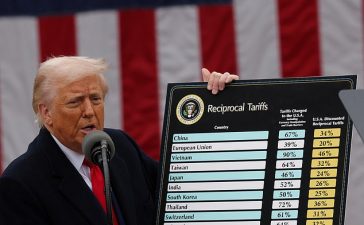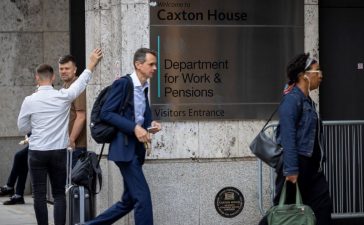Key events
UK services inflation – which has been a major factor behind inflation fears – is now the lowest since March 2022.
Adam Deasy, economist at PwC, said:
In a surprise drop, headline CPI came in at 2.5% for December 2024, down from 2.6% in November and 0.1 percentage points below consensus expectations. As in November, transport prices provided the biggest upward contribution, but large price reductions from restaurants and hotels paved the way for a monthly decrease.
The story is somewhat reversed from recent months. A significant contributor to elevated inflation fears has been services; the CPI services annual rate falling from 5.0% in November to 4.4% in December, representing the lowest level since March 2022, while goods inflation has ticked up in the month.
The fall in consumer price inflation could not come at a better time for both the Bank of England and No. 10. With UK growth momentum slowing further at the end of the year, the news that services inflation has finally cooled will be welcomed. UK bonds suffered in the recent market sell off, so any indication that inflation was continuing to run hot would have put pressure on the government to take action. Some pressures remain, particularly in light of the autumn budget, but this may be the green light the monetary policy committee needs to resume the rate cutting cycle.
Government bond yields ease in UK, US and eurozone ahead of US inflation
Government bond yields are easing across the UK, eurozone and United States, ahead of US inflation data, out at lunchtime.
Traders in the UK breathed a sigh of relief as inflation here unexpectedly dipped to 2.5%, giving the Bank of England room to cut interest rates next month.
The yield (or interest rate) on the 30-year gilt, as UK government bonds are known, has fallen by nearly 5 basis points to 5.399% – after soaring to to 5.472% on Monday, the highest since 1998.
The 10-year bond yield is a tad lower at 4.888% after hitting 4.925% last week, the highest since 2008.
The yield on Germany’s 10-year bond, the benchmark for the eurozone, dropped by 2 basis points to 2.597%, after touching a fresh seven-month high of 2.63%.
The pound has just reversed earlier losses and gained 0.1% against the dollar, to $1.2228.
Inflation for services also fell, to 4.4% from 5%, in another welcome development (a component closely watched by the Bank of England).
Ruth Gregory, deputy chief UK economist at Capital Economics, said:
While a lot of the surprisingly large fall in services inflation from 5.0% in November to 4.4% in December was due to a very sharp fall in airfares, underlying price pressures still appear a bit more favourable than we had thought. That strengthens the case for a 25bps interest rate cut in February and lends some support to our view that rates will fall further and faster than markets expect.
Our forecast is that CPI inflation will rebound in January, perhaps to almost 3.0% and that inflation will be a bit higher than most expect in the first half of this year. But we expect it to drop below the 2% target next year as the persistence of inflation fades further.
Overall, next Tuesday’s release of the wage growth figures for November will shed more light, but for now, we remain content with our forecast that the Bank will cut rates from 4.75% to 4.50% in February.
Markets now see 74% chance of February interest rate cut
Financial markets now see a 74% chance of an interest rate cut from the Bank of England at its next meeting in February, up from 62% before the inflation data.
They briefly priced in an 81% chance, as traders digested the news.
Reeves: ‘will fight every day’ to deliver economic growth
In her response to the inflation figures, Rachel Reeves, the chancellor, vowed to “fight every day” to deliver economic growth and “put more money in the pockets of working people”. She said:
There is still work to be done to help families across the country with the cost of living. That’s why the government has taken action to protect working people’s payslips from higher taxes, frozen fuel duty and boosted the national minimum wage.
In our Plan for Change, we were clear that growth is our number one priority to put more money in the pockets of working people. I will fight every day to deliver that growth and improve living standards in every part of the UK.
The drop in inflation brings some respite for the chancellor, Rachel Reeves, after a week of turbulence in financial markets.
In a key economic update just as the government battles to reassure jittery bond market investors, the latest snapshot could open the door for the Bank of England to cut interest rates from as early as next month.
Government borrowing costs – measured by gilt bond yields – started easing yesterday after rising sharply over the last week, heaping pressure on the government. The yield, or interest rate, on the 10-year gilt has edged down to 4.888%.
The pound is falling again, as is the euro, both under pressure from a strong dollar boosted by strong economic US data. Sterling is down 0.2% at $1.2188 at the moment while the euro dipped by 0.16% to $1.0291.
Here is our full story on inflation:
So inflation fell to 2.5% in December because hotel prices dipped and tobacco rose less than the year before, although this was partly offset by transport costs.
In transport, prices fell by less than a year earlier, mainly because of higher petrol and diesel and prices of secondhand cars, which were partially offset by a downward effect on inflation from air fares.
The average price of petrol rose by 1.4 pence to 136.2p per litre between November and December , down from 142.8p per litre in December 2023. Diesel prices rose by 2p per litre to 142.5p, down from 151.4p per litre in December 2023.
Air fares rose by 16.2% between November and December, down from the monthly rise of 57.1% a year earlier. It is normal for fares to rise into December, the ONS said, but the rise last month was the lowest December rise since December 2019, and it is the third-lowest December rise since monthly price collection began in 2001.
Part of the reason for the lower-than-usual growth may be because the return date for the European flights in last month’s index was Christmas Eve and the return date for long-haul flights was New Year’s Eve.
Food prices rose by 2% in the year to December, unchanged from November. Food inflation has fallen sharply since hitting a peak of 19.2% in March 2023, which was the highest annual rate for 45 years.
Prices were either unchanged or rose at a lower rate between November and December than a year earlier, for bread and cereals, and mineral water, soft drinks and juices.
However, prices of fruit, as well as sugar, jam, honey, syrups, chocolate, and confectionery went up.
Looking at the detail, the annual inflation rate for restaurants and hotels fell to 3.4% in December, from 4% in November, and marking the lowest annual rate since July 2021.
Prices at hotels fell by 1.9% between November and December, while prices at restaurants and cafes rose less than in the same period a year ago, contributing to the decline in overall inflation.
Prices for alcohol and tobacco rose at an annual rate of 5.3% last month, down from 6.8% in November, because of an increase in tobacco duty in November 2023. However, prices for alcoholic beverages such as wine fell by less than the year before.
UK inflation unexpectedly dips to 2.5% in December
UK inflation unexpectedly dipped last month, while the closely watched core rate, which strips out volatile energy and food costs, fell more than expected.
The consumer prices index rose by 2.5% in the 12 months to December, down from 2.6% in November, according to the Office for National Statistics. Economists had expected inflation to stay steady at 2.6%.
This is welcome news for the Bank of England, whose target is to keep inflation at 2% “over the medium term” – the next two years.
Core inflation fell to 3.2% from 3.5%, a bigger drop expected. City analysts had expected the rate to edge lower to 3.4%.
Thames Water plans executive pay rise to get around bonus cap – FT
Thames Water has reportedly threatened to raise executives’ base salaries if the UK government pushes ahead with plans to limit bonuses.
Britain’s largest water company, which intends to raise bills by at least a third for the 16m customers it serves in and around London, has warned the water regulator of its plans to raise base pay, according to a report by the company’s regulatory strategy committee to the board of Thames, the Financial Times reported.
The report dated 3 December, by Jon Haskins, chief risk and compliance officer at Thames, said, according to the paper:
We have made it very clear to Ofwat that, if it proceeds with its proposals, it is highly likely that base pay will need to be increased to compensate for the loss of performance-related pay plans.
We also highlight the impact the proposals will have on attracting, retaining and motivating critically needed talent across the sector, and the importance of this for attracting investment.
The plan to clamp down executive pay at badly performing water companies is part of the government’s water (special measures) bill, which is making its way through parliament and is expected to be ratified this year.
In November, the regulator determined that the sector had awarded “undeserved” extra payments, worth £6.8m, forcing investors at Thames, Yorkshire Water and Dŵr Cymru Welsh Water to pick up the tab for executive bonuses.
Ofwat said it had used new powers to ensure that bonuses at the three companies were paid by shareholders and bondholders – rather than through customer bills – because the payments had not “adequately reflected overall company performance issues”.
Water companies have faced public anger and political backlash in recent years over leaks and sewage overflows as they have also come under increasing financial strain.
Nine water companies will not be allowed to use customer funds to pay bonuses worth £6.8m. Six voluntarily said that shareholders would pay, but Ofwat had to use its powers directly in the cases of bonuses worth £1.5m from Thames, Yorkshire and Welsh.
Ellie Henderson, a UK economist at Investec, is expecting UK inflation to tick up to 2.7%.
Similar to November’s increase, we do not single out one particular factor behind the rise. Instead our forecast reflects the confluence of various upward influences, including base effects once again. One unknown is to what extent businesses are already preparing for the higher cost of labour come April – itself a reflection of higher NICs [national insurance contributions] and changes to the national living wage – by starting to increase prices. Being extremely volatile in nature, airfares also have the potential to cause swings in the headline inflation rate. We expect there was a small boost to inflation from this component in December.
From there we forecast inflation to remain above the 2% target for the entirety of 2025, but the core measure to make further progress lower from the spring. This disconnect can largely be explained by energy prices, with the absence of the sharp falls in prices over the course of 2024 lifting inflation in 2025. Some inflationary impact from the budget is also likely to feed into overall cost pressures. The big unknown at this point is the shape of Trump trade policy, and crucially, the response of others including the UK to any significant changes.
Introduction: UK inflation forecast to come in above target again in December
Good morning, and welcome to our rolling coverage of business, the financial markets and the world economy.
It’s inflation day! We’ll be getting inflation figures for the UK first thing, followed by US data later in the day.
UK inflation is expected to have stayed at an annual rate of 2.6% in December, while the core rate, which strips out volatile energy and food costs, is forecast to have edged lower.
The figures will be released by the Office for National Statistics at 7am GMT. The Bank of England’s target is to keep inflation at 2% over “the medium term,” i.e. the next two years.
Core inflation is expected to have dipped to 3.4% from 3.5% in November, still uncomfortably high for the central bank.
Michael Field, European equity strategist at Morningstar, said:
UK inflation is expected to remain steady at 2.6% for December. While the word steady usually sounds like a good thing, investors and central bankers will be relatively unhappy with the current level, which sits significantly above the Bank of England’s 2% targeted level. We believe it’s too early to be talking about the prospect of Stagflation, but it’s certainly something already concerning many investors.
The one positive in the mix is that core inflation, which strips out volatile components such as food and energy, is expected to decline slightly to 3.4%. But once again, this number sits far above the targeted level for inflation.
Some investors have been vocally critical about the seemingly slow pace at which the Bank of England is cutting rates. Ultimately, we do not believe that inflation will ramp up any further, but getting inflation consistently closer to the key 2% level might be difficult from here. So perhaps we should already be adjusting our expectations for interest rate cuts in 2025.
Markets are on tenterhooks ahead of the US inflation figures for December. They are expected to show an increase to 2.9% in the annual rate in December, from 2.7% in November.
Traders have already scaled back their bets on US interest rate cuts, and are only expecting one quarter-point reduction by December.
The Agenda
-
9am GMT: International Energy Agency releases monthly oil report
-
9am GMT: Germany 2024 GDP
-
1.30pm GMT: US inflation for December (previous: 2.7%; forecast: 2.9%)






